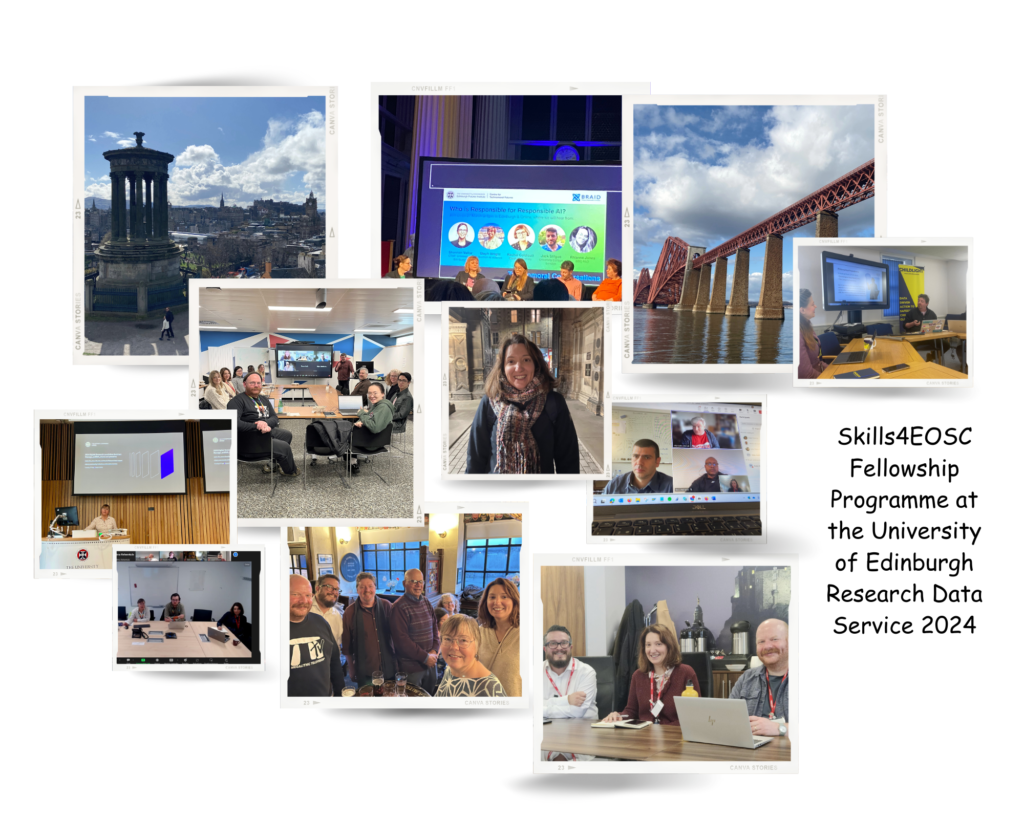This is a guest blog post from Clara Parente Boavida, about her fellowship with the Research Data Service as part of a European Open Science Cloud (EOSC) project.
My name is Clara Parente Boavida and I work in the Research Support Office at Iscte-Instituto Universitario de Lisboa (Portugal). I applied for the first call of the Skills4EOSC Fellowship Programme and between 11th March to 5th April I worked with an amazing team at Research Data Service at the University of Edinburgh.
The Skills4EOSC Fellowship Programme aims to address the need to promote and sustain professional roles dedicated to open research by supporting short-term secondments.
Among the three different types of fellowships, I have chosen a Research Data Support internship. This placement allowed me to actively participate in the day-to-day activities related to research data support, providing an immersive experience and a comprehensive understanding of research data management practices within the host institution.
I would like to congratulate the Skills4EOSC project for this initiative and thank everyone who has helped to make this opportunity possible. I’m grateful for the support of my institution (Vice-Rector Jorge Costa and Carina Cunha), I’m grateful to Robin Rice for the extraordinary welcome and I’m grateful to all the people I’ve had the opportunity to talk to and interact with during this month.
“the essential is invisible to the eyes”
Antoine de Saint-Exupéry’s novel “The Little Prince”
Each week’s agenda was carefully prepared with my expectations and interests in mind. The University of Edinburgh has a busy life in terms of Research Data Management. Not only in collaboration with various services within the University, but also with the external community. This holistic view has made me reflect about the different services that Research Data Management intersects with. Success comes from healthy and effective relationships with different stakeholders.

I was involved in the day-to-day activities of different members of the team, and each experience added something new. I had the opportunity to attend face-to-face events, one-to-one meetings, kick-off meetings, as well as online meetings and events. I also took part in internal team meetings and service meetings. Informal activities were carefully planned to allow the Research Data Service team to interact with each other and to allow other teams to be involved.
I had one-to-one meetings with each member of the Research Data Support team about: DataShare, DataVaut, training programme, DMP, DMPonline, Research Data Management Policy and Metrics. I had one-to-one meetings with members of other teams: Open Research, Scholarly Communications, Research Information Systems, Digital Research Services, and Edinburgh Research Office.
I attended a number of events in person: Digital Research Lunchtime Seminar: How to interpret and analyse your data efficiently; Open Research Scotland Meeting; Open Science Framework Workshop Modules 1, 2, 3 & 4; Ethics & Data Management at the Childlight GDF Residency; Technomoral Conversations: Who is Responsible for Responsible AI?; Library Tour for Staff, and Digital Research Lunchtime Seminar: Manage, publish, share and preserve.
I also participated in online events: Updating the DataCite Metadata Scheme webinar; UK Research Network (UKRN) webinar on Indicators for Open Research; UKRN Indicators Pilot 2 online meeting; UKRN Pilot 1 kick-off meeting; Writing a Data management plan, for the Health in Social Science School; and Working with Personal and Sensitive Data. I also had the opportunity to organise an online meeting with Mike Wallis (Research Services, IT Infrastructure) and the IT Services of Iscte to answer questions about DataStore.
In terms of personal contributions, I wrote suggestions for updates to MANTRA Unit 1, part of an open access Research Data Management Training course. I had the opportunity to demonstrate the interoperability process between CRIS systems and OpenAIRE, and also how to link EC funded projects to publications and datasets.
Finally, I designed a Research Data Management Roadmap for the Iscte. This roadmap intends to guide the work to be developed over the next three years towards the implementation of a RDM Service for the Iscte-Instituto Universitário de Lisboa. It incorporates lessons learned during the Skills4EOSC Fellowship Programme at the University of Edinburgh. It is also aligned with the Human Resources Excellence in Research Award (HRS4R) principles for researchers, which is a mechanism through which the European Commission seeks to ensure that concrete steps are put in place by institutions to enhance working conditions for researchers across Europe, as set out in the European Charter and Code.
